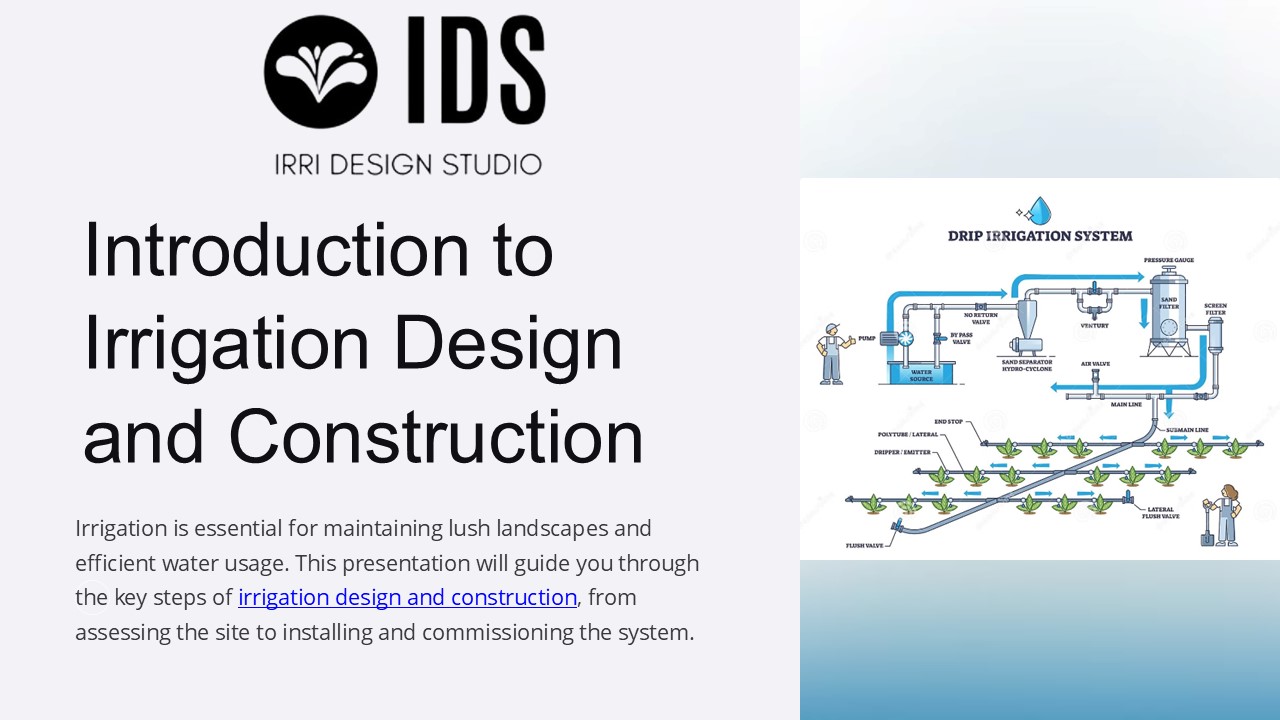Introduction to Irrigation Design and Construction - PowerPoint PPT Presentation
Title:
Introduction to Irrigation Design and Construction
Description:
Dive into the essentials of irrigation design and construction. It covers site assessment and analysis, understanding key irrigation system components, and performing hydraulic calculations. Learn how to select and place sprinkler heads effectively, manage irrigation control systems, and ensure proper installation and commissioning of the system. Perfect for those looking to master the fundamentals of efficient water management. Visit here for more information. – PowerPoint PPT presentation
Number of Views:8
Title: Introduction to Irrigation Design and Construction
1
Introduction to Irrigation Design and Construction
Irrigation is essential for maintaining lush
landscapes and efficient water usage. This
presentation will guide you through the key steps
of irrigation design and construction, from
assessing the site to installing and
commissioning the system.
2
Site Assessment and Analysis
Topography
Soil Conditions
Climate Factors
Evaluate the site's slopes, elevations, and
drainage patterns to determine the optimal layout
and water flow.
Analyze the soil type, infiltration rate, and
nutrient content to select the right irrigation
components.
Consider temperature, precipitation, and wind to
design a system that adapts to the local
environment.
3
Irrigation System Components
Water Source
Determine the water supply, whether it's a well,
municipal line, or other source.
Control Valves
Integrate valves to manage water flow and
pressure throughout the system.
Sprinkler Heads
Select the appropriate sprinkler types and
placement to achieve uniform coverage.
Control System
Utilize a programmable controller to automate
irrigation schedules and monitor performance.
4
Hydraulic Calculations and Design
Water Demand
1
Determine the total water flow rate and pressure
requirements based on the landscape area and
plant needs.
Pipe Friction Loss
2
Calculate the pressure drop due to friction in
the pipes to ensure adequate water delivery.
Pump Sizing
3
Select the appropriate pump capacity and type to
meet the system's hydraulic demands.
5
Pipe Sizing and Layout
Pipe Material
Polyethylene, PVC, Copper
Pipe Diameter
1/2" to 4" based on flow rates
Layout Configuration
Main, lateral, and distribution pipes
Trenching Depth
12-24 inches below grade
6
Sprinkler Head Selection and Placement
Rotor Sprinklers
Spray Sprinklers
Ideal for large, open areas with maximum coverage
and uniform water distribution.
Suitable for smaller, more enclosed spaces with a
focused water pattern.
Drip Emitters
Spacing and Overlap
Efficient for watering specific plants or
landscaping features with precise application.
Carefully position sprinklers to achieve the
desired coverage and avoid dry spots.
7
Irrigation Control Systems
Automatic Timers
Program schedules for efficient, hands-off
watering based on site requirements.
Sensors
Integrate soil moisture, rain, and flow sensors
to optimize water usage.
WiFi Connectivity
Remote monitoring and adjustments allow for
convenient system management.
8
Installation and Commissioning
Site Preparation
1
Excavate trenches, install pipes, and set up
sprinkler heads and valves.
Pressure Testing
2
Verify the system's integrity and identify any
leaks or issues.
System Programming
3
Configure the control system for optimal watering
schedules and performance.
Final Inspection
4
Ensure the entire irrigation system is
functioning correctly before commissioning.
9
THANK YOU
Contact Us
(407)-744-3658
connor_at_irridesignstudio.com
www.irridesignstudio.com
318 North John Young Parkway, Suite 2 Kissimmee,
Florida(USA)































